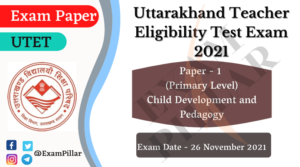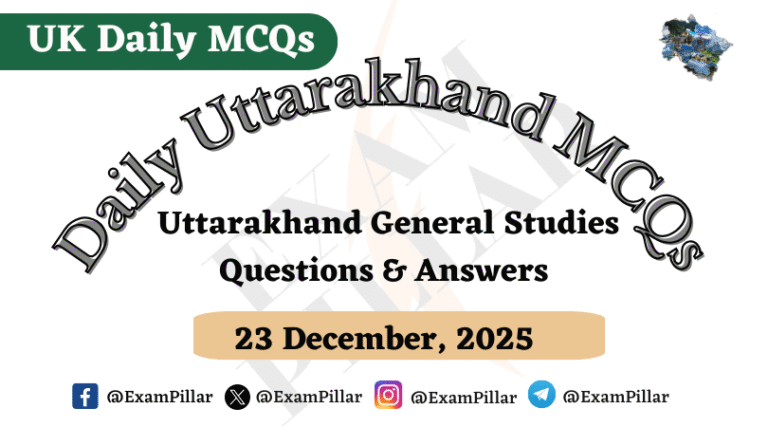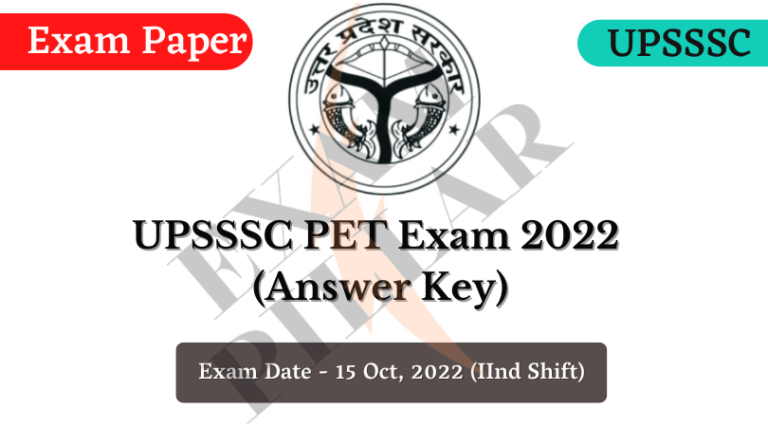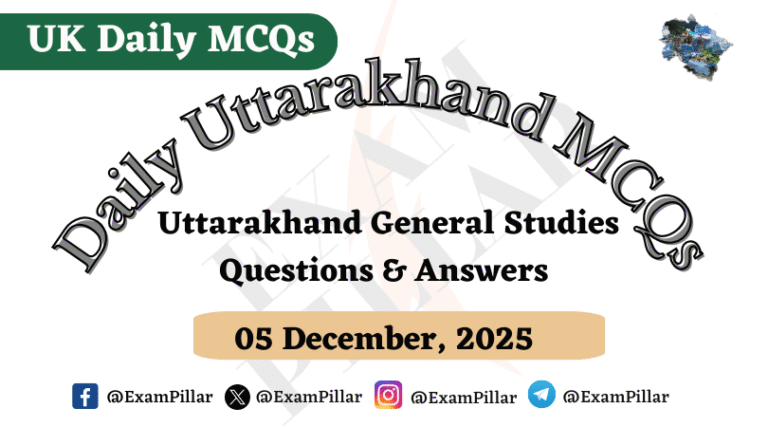UBSE (Uttarakhand Board of School Education) Conduct the UTET (Uttarakhand Teachers Eligibility Test) Dec 2021 Exam held on 26 November 2021. Here UTET Paper 1 Child Development and Pedagogy Subject Paper with Official Answer Key.
UTET (Uttarakhand Teachers Eligibility Test) Primary Level
(Class 1 to Class 5)
Exam :− UTET (Uttarakhand Teachers Eligibility Test)
Part :− Child Development and Pedagogy
Organized by :− UBSE
Number of Question :− 30
SET – A
Exam Date :– 26th November 2021
UTET 26 Nov 2021 (Primary Level)
| UTET Primary Level Paper Official Answer Key | Link |
| UTET Exam 26 Nov 2021 – Paper – 1 (बाल विकास एवं शिक्षण विज्ञान) | Click Here |
| UTET Exam 26 Nov 2021 – Paper – 1 (Child Development and Pedagogy) | Click Here |
| UTET Exam 26 Nov 2021 – Paper – 1 (Language – I : Hindi) | Click Here |
| UTET Exam 26 Nov 2021 – Paper – 1 (Language – II : Hindi) | Click Here |
| UTET Exam 26 Nov 2021 – Paper – 1 (Language – II : Sanskrit) | Click Here |
| UTET Exam 26 Nov 2021 – Paper – 1 (Language – I : English) | Click Here |
| UTET Exam 26 Nov 2021 – Paper – 1 (Language – II : English) | Click Here |
| UTET Exam 26 Nov 2021 – Paper – 1 (गणित ) | Click Here |
| UTET Exam 26 Nov 2021 – Paper – 1 (Mathematics) | Click Here |
| UTET Exam 26 Nov 2021 – Paper – 1 (पर्यावरण अध्ययन) | Click Here |
| UTET Exam 26 Nov 2021 – Paper – 1 (Environmental Studies) | Click Here |
UTET Exam Nov 2021 Paper – 1 (Primary Level)
(Child Development and Pedagogy)
(Official Answer Key)
1. Interest refers to –
(A) An individual’s preference for engaging in one or more specific activities related to others.
(B) Relatively enduring characteristics of a person that make her or him distinct from others.
(C) An individual’s underlying potential for acquiring skills.
(D) The global capacity to understand the world, think rationally and use the available resources effectively when faced with challenges.
Click To Show Answer/Hide
2. Which of the following methods involves seeking information from a person on a one-to-one basis?
(A) Case study
(B) Self-report
(C) Interview
(D) Observation
Click To Show Answer/Hide
3. Which of the following statements is not correct about development?
(A) Development is lifelong, l.e., it takes place across all age groups starting from conception to old age.
(B) Development is influenced by historical conditions.
(C) Development is uni-dimensional.
(D) Development is highly plastic.
Click To Show Answer/Hide
4. Development of symbolic thought and establishment of object permanence is visible in which of the following stages of cognitive development according to Piaget?
(A) Sensori motor
(B) Preoperational
(C) Concrete operational
(D) Formal operational
Click To Show Answer/Hide
5. The stage of life that begins at the onset of puberty, when sexual maturity or the ability to reproduce is attained is commonly known as –
(A) Childhood
(B) Infancy
(C) Adulthood
(D) Adolescence
Click To Show Answer/Hide
6. Which of the following statements is correct about adolescence?
(A) Imaginary audience is adolescents belief that others are as preoccupied with them as they are about themselves.
(B) Adolescents’ sense of uniqueness makes them think that no one understands them or their feelings.
(C) Personal fables are often part of adolescent diaries.
(D) All of the above.
Click To Show Answer/Hide
7. Anorexia nervosa is a –
(A) sleeping disorder
(B) mental disorder
(C) eating disorder
(D) physical disorder
Click To Show Answer/Hide
8. The process of adjusting to bright light after exposure to dim light is called –
(A) Regeneration
(B) Light adaptation
(C) Dark adaptation
(D) Saturation
Click To Show Answer/Hide
9. Which of the following statements is correct about learning?
(A) Learning is any relatively permanent change in behaviour.
(B) Learning always involves some kind of experience.
(C) Learning is an inferred process and is different from performance,
(D) All of the above.
Click To Show Answer/Hide
10. Which of the following is not a characteristic feature of formal assessment?
(A) Varies from case to case
(B) Objective
(C) Standardized
(D) Organised
Click To Show Answer/Hide
11. The two-factor theory of intelligence was proposed by –
(A) Howard Gardner
(B) Robert Sternberg
(C) Charles Spearman
(D) Lev Vyogotsky
Click To Show Answer/Hide
12. Response, organization and characterization are included in which domain of educational objectives?
(A) Cognitive domain
(B) Affective domain
(C) Psychomotor domain
(D) None of these
Click To Show Answer/Hide
13. Which of the following is not a technique of motivation?
(A) Reward and Punishment
(B) Praise and reproof
(C) Novelty
(D) Recall
Click To Show Answer/Hide
14. Factor influencing emotional development in children is –
(A) Health and Physical development
(B) Family atmosphere and relationship
(C) Neighbourhood, community and society
(D) All of the above
Click To Show Answer/Hide
15. Type R-conditioning is known as –
(A) Classical conditioning
(B) Operant conditioning
(C) Connectionism
(D) Experiential Learning
Click To Show Answer/Hide





Leave a Reply